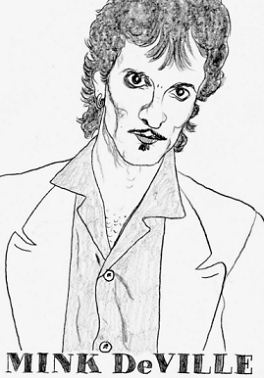
Rock'n'Soul, yeah. Den Song "Just To Walk That Little Girl Home" haben Mink DeVille bereits 1979 als Single bei Capitol Records veröffentlicht, ich rede hier aber von einer Liveversion des Songs, die 1984 bei einem Konzert in Nijmegen, Niederlande mitgeschnitten wurde und auf der 2011 bei Eagle Records veröffentlichten CD "Come A Little Bit Closer - The Best Of Willy DeVille Live" zu finden ist. Die Band Mink DeVille wurde 1974 von Billy Borsay (Vocals, Harmonica, Guitar), Rubén Sigüenza (Bass) und Manfred Jones alias Thomas Robert Allen Jr. (Drums) in San Francisco, Kalifornien gegründet. Anfangs nannte sich die Band noch Billy DeSade & The Marquis. Willy DeVille: I met Manfred at a party, he'd been playing with John Lee Hooker and a lot of blues people around San Francisco. I met Rubén at a basement jam in San Francisco, and he liked everything I liked from The Drifters to, uh, Fritz Lang. (...) We were playing the leather bars down on Folsom Street. We were Billy DeSade & The Marquis then. We played the Barracks. After a while they would take their clothes off. This one guy - Jesus Satin he called himself - he'd dance on the pool table. It was nuts! Crazy! Im Jahr 1975 nannte sich die Band in Mink DeVille um und aus Billy Borsay wurde Willy DeVille. Von 1975 bis 1977 waren Mink DeVille die Hausband im New Yorker Nightclub CBGB. Alex Halberstadt: Onstage, Willy's band, Mink DeVille, had nothing in common with the new wave CBGB bands that the press had lumped them with... at heart Mink DeVille was an R&B band and Willy an old-fashioned soul singer. Mink DeVille unterschrieben 1976 bei Capitol Records und 1977 erschien ihr Debütalbum "Cabretta". Die Band bestand nun aus Willy DeVille, Rubén Sigüenza, Manfred Jones, Louis X. Erlanger (Guitar, Vocals), Bobby Leonards (Piano, Keyboards) und Steve Douglas (Saxophone). Das Album verkaufte sich mäßig, aber mit dem Song "Spanish Stroll" konnten Mink DeVille in den Charts von Großbritannien, Neuseeland und Niederlande punkten. Bei Capitol Records erschienen dann noch die beiden Alben "Return To Magenta" 1978 und "Le Chat Bleu" 1980 von Mink DeVille. Beim Album "Return To Magenta" ist als Gastmusiker Dr. John alias Mac Rebennack am Piano mit dabei. Willy DeVille: I had band problems, manager problems, record company problems. And yeah, I had drug problems. Finally I got a new recording contract with Atlantic, and a new manager. I cleaned up my act. I figured that since playing music with people I was friends with didn't seem to work out, I would hire some mercenaries, some cats who just wanted to play and get paid. And those guys turned out to be more devoted to the music than any band I ever had. They're professional, precise, but they're full of fire, too. Die neuen Mink DeVille waren Willy DeVille, Ricky Borgia (Guitar), Kenny Margolis (Piano, Accordion, Vibraphone), Joey Vasta (Bass), Thommy Price (Drums), Jimmy Maelen (Percussion), Brother Johnny Espinet (Percussion) und Louis Cortelezzi (Saxophone). Bei Atlantic Records erschienen die beiden Alben "Coup De Grâce" 1981 und "Where Angels Fear To Tread" 1983. Bei Polydor Records erschien dann 1985 noch das Album "Sportin' Life" und danach war Schluss mit Mink DeVille. Willy DeVille versuchte es solo, naja, nicht solo, aber unter seinem eigenen Künstlernamen. Das erste Willy-DeVille-Album war "Miracle" 1987 bei Polydor Records, es war auch das letzte bei einem sogenannten Major Label. Willy DeVille: This is the first album where I had left-overs. The doggy bag! I got good stuff on the record. I got good stuff off the record - 22 songs! I wrote and I wrote... it was a cakewalk. It was so easy. Of course we had some problems. It was so powerful, nothing could get in the way. We worked on the album for four or five months. Mit den Alben "Loup Garou" 1995 bei EastWest Records und "Crow Jane Alley" 2004 schaffte es Willy DeVille sogar in die österreichischen Charts, Platz 46 und Platz 72. Wow. Auf "Loup Garou" befindet sich der Song "You’ll Never Know", ein Duett mit der Sängerin Brenda Lee. Willy DeVille: She's amazing, and so professional. She's just this tiny little woman who has this great big voice. I had to cool out her accent a little bit. She had a real cracker-type of accent. I guess it's gotten thicker over the years, because she didn't sound like that when she was a teenager doing "Sweet Nothin's". Das letzte Album von Willy DeVille war "Pistola" 2008 bei Eagle Records. Er starb 2009 im Alter von 58 Jahren an Bauchspeicheldrüsenkrebs. Willy DeVille: Die Menschen, die mir das Tor zur Welt aufstießen, kamen durchs Radio zu mir. Billy Holliday, Johnnie Ray, Muddy Waters, meist schwarze Sänger*innen. Meine Mutter erzählt, ich hätte die ersten Melodien gesummt, ehe ich sprechen konnte. Das ist verwunderlich, weil meine ganze Familie unmusikalisch ist. Rythm'n'Blues galt als etwas Primitives. Aber bei mir hat dieser urwüchsige, kraftvolle Sound direkt das Herz getroffen. Wenn das primitiv war, wollte ich auch so ein Primitivling werden.
10.09.2021